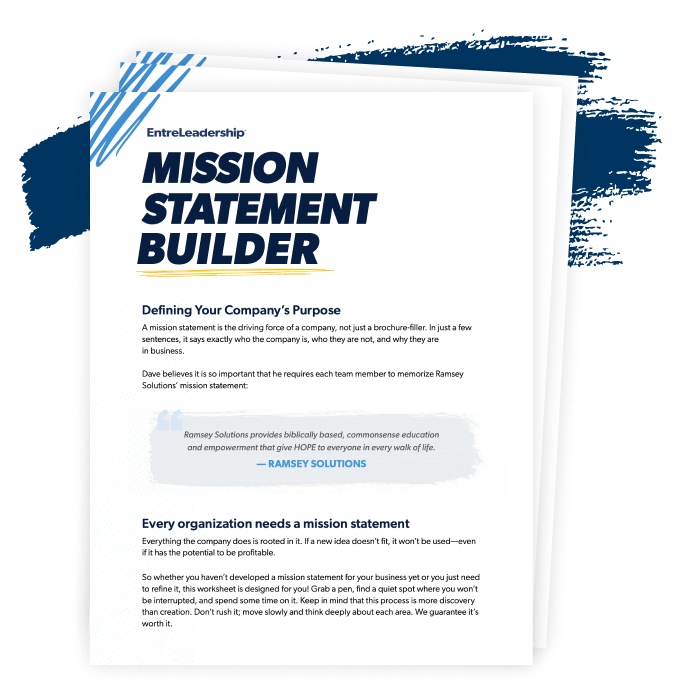
Picture Snow White's family of dwarfs heigh-hoing their way to work every day with a whistle and a song. It’s the ultimate picture of a family in business.
Sharing work you love with people you love truly can be a blast. But a lot of times it leans more nightmare than fairy tale. Why? Because a family business is only as functional as the family behind it. If your family members don’t know how to be a functional family—by doing things like collaborating, handling conflict, and solving problems—the last thing you want to do is bring that infection into the business. Working together day after day only magnifies your issues.
So how do you build a family-owned business that leaves a legacy instead of a trail of damage? Let's dive into four common family business challenges. Then we’ll look at the real causes of family business conflict and how to overcome them.
4 Challenges of Running a Family-Owned Business
Here’s what often threatens family businesses most:
1. Drama
Drama in your family business can get personal fast. Imagine CEO Sue is mad at her brother Eddie, who manages operations, because he says he can’t afford to chip in on the family vacation rental then buys a new fishing boat two weeks later. The nerve.
Tensions like this often spill into the office, causing distractions, resentment and bad blood. Next thing you know, you’re dealing with gossip, jealousy and unresolved grudges that create a toxic work environment faster than you can say “emotional roller coaster.”
2. Conflict
The list is long for potential family business conflicts. Without clear boundaries, one family member might be making deals and taking calls at all hours. But another may be the opposite, regularly coming in late and leaving work early for personal appointments and family responsibilities. The thing is, they both feel justified in their priorities and work ethic. Seriously?
Just like in a marriage, finances often cause conflict in family businesses. If you’re the chief financial officer and think it’s time to share profits among team members, but your dad, the founder, wants to reinvest them in the business, the perfect storm is brewing.
Different views often create friction. But family conflict gets worse when you’re so overly familiar that you publicly disrespect each other. Sure, it’s tempting to give an eye roll or use your condescending dad voice in a personal clash, but the minute you drop your guard in a work meeting, you’ve set a bad example and invited more sparks to fly.
Conflict is just as dangerous when you avoid it. You might be concerned about hurting a family member’s feelings, but if you bypass hard conversations and healthy disagreements, you can’t resolve problems.
3. Misalignment Between Family Members
When your car isn’t aligned, what happens to it? It pulls to one side, making it hard to drive straight and causing your tires to wear unevenly. That creates even more problems down the road. Lack of alignment in business is similar. It causes you and your team members to move in different directions and wear yourselves out even though you’re trying to take new ground. Now what do you do?
Being misaligned in business happens when you and your family members have different ideas about how to run things. And having different ideas usually goes back to family members misunderstanding or failing to honor your company’s mission, vision and values. For example, you might believe selling to customers starts by genuinely serving them—so you make marketplace service a core value. But your sister (the bookkeeper) sees profit as the most important business goal—period. Sell, sell, sell. Differing values like these pull the business in opposite directions.
4. Lack of a Succession Plan
Planning your eventual transition out of the business is crucial, but it’s often overlooked. We get it—no one wants to think about their death or handing someone else the business they’ve worked so hard to build. Can’t you just toss the keys to the next person in line to run the business as you fall into your grave? That seems way easier.
You probably thought running a business sounded fun—until you realized it would actually run you. Discover the EntreLeadership System—the small-business road map that takes the guesswork out of growth.
The thought of transitioning your business is especially challenging if you’re the first-generation founder passing it to the second generation. After all, you clawed and scratched your way to success, starting with nothing. Nobody sees things like you do. And you tell yourself you’re not going to let anyone screw things up.
But without a solid plan for a handoff, you’ll get beat up by unclear roles, power struggles and misunderstandings that crumble all you’ve built. Business management expert Peter Drucker wisely said, “The final test of greatness in a CEO is how well he chooses a successor and whether he can step aside and let his successor run the company.” When it comes to taking over a family business, ignorance isn’t blissful for anyone.
What’s Really Causing Family Business Issues?
As much as family business issues seem like they’re about a cousin, sibling or parent annoying you, ultimately the problem lies in you if you’re the leader. That stings a little, but here’s the good news: If you’re the problem, you’re also the solution. To fix what’s gone bad in your family business, focus on the issues you can control, starting with these:
1. Bad Communication
As Ramsey Solutions President Daniel Ramsey says, “You have to have a healthy level of conflict . . . If everyone just nods along with every decision, then you’re not actually having the real conversations you need to be having.” Don’t keep your team in the dark, avoid hard conversations, or dodge complicated decisions and relationships. Creating regular communication rhythms like weekly staff meetings, one-on-ones and leader meetings makes space for dealing with issues big and small as they arise.
2. Lack of Clarity
We’ve all heard stories of the 80-something-year-old business founder who dangles a leadership carrot but never lets their adult son or daughter actually run the business they’ve been promised. Then there’s the family member hired to do a role they’re overqualified or underqualified for, and they can’t win for trying. Or the ones who step all over each other because their roles aren’t defined. That’s confusing and unhealthy for everyone.
Your business plans and team-member expectations (whether they’re a family member or not) must be crystal clear. Pro tip: Make sure every team member is on board with your mission, vision and values. A clear mission lets everyone know why your business exists, your vision paints a picture for where it’s going, and your values shape your company culture.
Get the Free Mission Statement Builder
You don’t have to figure it out alone! Download the easy-to-follow EntreLeadership Mission Statement Builder that will help you write a mission statement that gets you and your team fired up and on the same page.
3. No Boundaries
In a family business, everyone wears a lot of hats. And when it comes to boundaries, you have to be sure you wear the right hat at the right time in the right place. At work, you’re not Dad, Mom, Bub, Auntie or any other family name. You’re a professional—along with every other team member—and while you’re at work, your job is to do things that move the mission forward and advance your business. So set the professional boundaries of calling each other by first names, holding each other to high standards, and treating each other with respect.
Away from the office, kick back and rock your family hat. No talking business at the Thanksgiving dinner table, no treating each other like business associates, and definitely no work distractions. Enjoy the family God gave you.
4. Building Your Team by Default Instead of Calling
No one on your team should be there just because they share your last name. Joining the family business has to be a calling—not a convenient next step or because “it’s just what’s expected.” Does everyone on the team (family members included) buy into your vision and values? Is their purpose to carry out your mission? If the answer is no, they’ll harm the culture and kill the unity.
Overcoming Family Business Challenges
With all this talk on family business challenges and underlying issues, is it even possible for your family members to whistle while they work? Of course!
When things get stressful or relationships get tense, remind yourself what you love about running your own business. For starters, you get to be your own boss, make a difference in the world, and build a freaking awesome family legacy.
Your next step is to get your family members on the same page and bought in to their opportunities too. That’s easier said than done when you go it alone. But when you follow a proven blueprint, you’ll equip them to fight shoulder to shoulder with you in the marketplace.
The EntreLeadership System is that blueprint. Thousands of family business leaders have used it already to:
- Get clear direction for their stage of business
- Know what to focus on to drive their business forward
- Grow their business with confidence and peace—and fewer family feuds
You can take the guesswork out of growth and build the business you love too.
What’s Next: Whistle While You Work
- Read 12 Tips for Running a Family-Owned Business.
- Apply the EntreLeadership System to your business.
